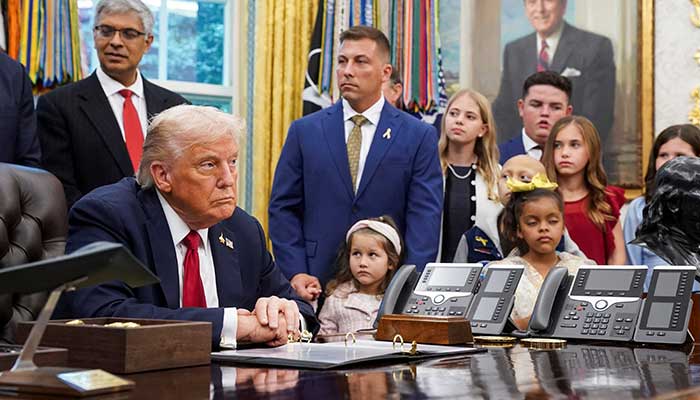Nobel for Trump?
Out of 105 Nobel Peace Prizes awarded, eight have recognised individuals for their roles in ending wars
October 05, 2025

Of the 105 Nobel Peace Prizes awarded, eight have recognised individuals for their roles in ending wars.
These include Theodore Roosevelt for brokering peace in the Russo-Japanese War; Woodrow Wilson for his role in the peace treaty following World War I; Léon Bourgeois for his role in implementing the League of Nations treaty to end World War I hostilities; Austen Chamberlain and Charles Dawes for their role in Dawes Plan, which prevented renewed conflict in Europe; Henry Kissinger for his role in securing a ceasefire in Vietnam; Menachem Begin and Anwar Sadat for negotiating peace between Egypt and Israel; and John Hume and David Trimble for their role in the peaceful resolution to the Northern Ireland conflict.
Yes, these awards specifically honour laureates whose actions directly halted ongoing wars. These eight prizes represent about 7.6% of all Peace Prizes – and of the 111 individual laureates, these 10 individuals account for roughly 9.0%.
Remember, Menachem Begin and Anwar Sadat were awarded the 1978 Nobel Peace Prize for negotiating a treaty that formally ended the state of war between Egypt and Israel.
In 2020, President Trump achieved a comparable breakthrough by normalising diplomatic, economic and security relations between Israel and four Arab nations: the UAE, Bahrain, Morocco and Sudan.
Remember, Chamberlain's 1925 Nobel for forestalling post-WWI hostilities. In 2020, President Trump facilitated the Washington Agreement between Serbia and Kosovo that de-escalated ethnic tensions simmering since the 1999 Kosovo War, which killed 13,000 and displaced 1.5 million.
Recall Woodrow Wilson's 1919 Nobel Peace Prize for ending World War I's carnage.
In 2020, the Trump-led Doha Agreement with the Taliban paved the way for the full US withdrawal from Afghanistan, formally ending the 20-year war.
In May 2025, the US-brokered ceasefire — championed by President Trump — averted a nuclear catastrophe during the escalating Pakistan-India crisis, halting four days of intense airstrikes and shelling that had raised global alarms.
In June 2025, Trump mediated a landmark peace deal in Washington, signed by Rwanda and the Democratic Republic of the Congo, promising to end three decades of brutal conflict.
In July 2025, President Trump's threat of imposing 36% trade tariffs on Thailand and Cambodia spurred both nations to declare a ceasefire, halting five days of deadly border clashes that resulted in over 40 deaths and displaced hundreds of thousands.
In August 2025, Trump hosted leaders of Armenia and Azerbaijan, where they signed a Trump-brokered joint declaration to resolve the decades-long Nagorno-Karabakh conflict.
These feats prompt four pressing questions: First, has President Trump amassed a portfolio of peace-brokering triumphs that rivals the legacies of past Nobel Peace Prize laureates? Second, do historical precedents align closely with Trump's unconventional approach?
Third, has Trump truly averted millions of potential casualties — arguably surpassing singular achievements like Theodore Roosevelt's mediation of the Russo-Japanese War? Fourth, hasn't Trump's role in resolving eight major conflicts between 2020 and 2025 surpassed the raw number of war-ending Nobels awarded in the prize's entire 124-year history?
With the 2025 Nobel Peace Prize announcement looming on October 10, these aren't mere academic queries. They'll serve as a litmus test for how the Norwegian Nobel Committee balances high-stakes mediation against geopolitical optics, personal controversies and the prize's evolving ethos.
Disclaimer: The viewpoints expressed in this piece are the writer's own and don't necessarily reflect Geo.tv's editorial policy.
The writer is a columnist based in Islamabad. He posts @saleemfarrukh and can be reached at: [email protected]
Originally published in The News











